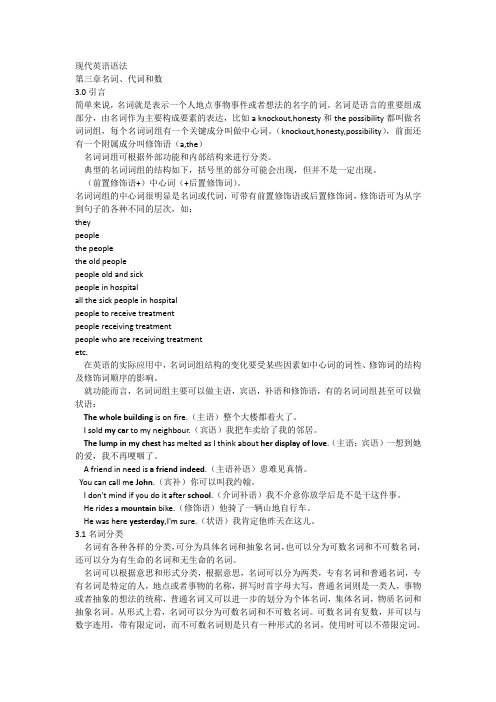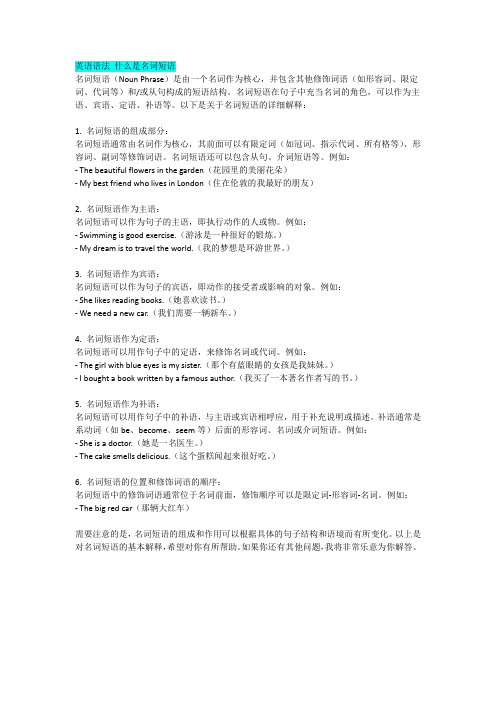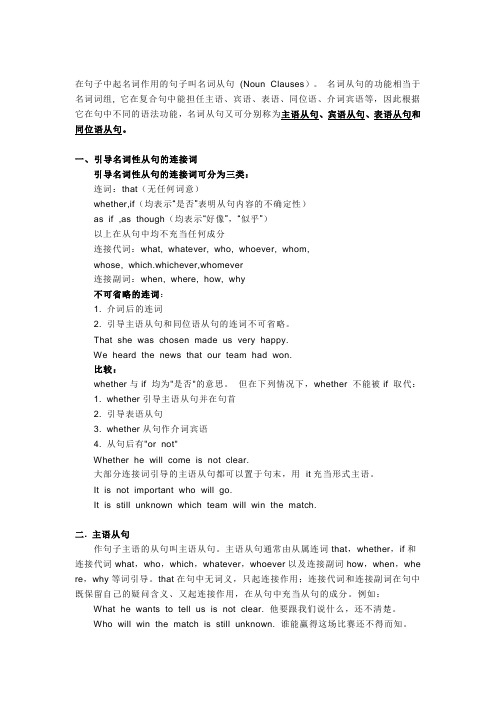自考现代英语语法学习笔记--名词和名词短语
自考现代英语语法第三章翻译

现代英语语法第三章名词、代词和数3.0引言简单来说,名词就是表示一个人地点事物事件或者想法的名字的词。
名词是语言的重要组成部分,由名词作为主要构成要素的表达,比如a knockout,honesty和the possibility都叫做名词词组,每个名词词组有一个关键成分叫做中心词。
(knockout,honesty,possibility),前面还有一个附属成分叫修饰语(a,the)名词词组可根据外部功能和内部结构来进行分类。
典型的名词词组的结构如下,括号里的部分可能会出现,但并不是一定出现。
(前置修饰语+)中心词(+后置修饰词)。
名词词组的中心词很明显是名词或代词,可带有前置修饰语或后置修饰词,修饰语可为从字到句子的各种不同的层次,如:theypeoplethe peoplethe old peoplepeople old and sickpeople in hospitalall the sick people in hospitalpeople to receive treatmentpeople receiving treatmentpeople who are receiving treatmentetc.在英语的实际应用中,名词词组结构的变化要受某些因素如中心词的词性、修饰词的结构及修饰词顺序的影响。
就功能而言,名词词组主要可以做主语,宾语,补语和修饰语,有的名词词组甚至可以做状语:The whole building is on fire.(主语)整个大楼都着火了。
I sold my car to my neighbour.(宾语)我把车卖给了我的邻居。
The lump in my chest has melted as I think about her display of love.(主语;宾语)一想到她的爱,我不再哽咽了。
A friend in need is a friend indeed.(主语补语)患难见真情。
英语语法基本知识——名词短语(2)

在句子中起名词作用的句子叫名词从句 (Noun Clause s)。
名词从句的功能相当于名词词组, 它在复合句中能担任主语、宾语、表语、同位语、介词宾语等,因此根据它在句中不同的语法功能,名词从句又可分别称为主语从句、宾语从句、表语从句和同位语从句。
一、引导名词性从句的连接词引导名词性从句的连接词可分为三类:连词:that(无任何词意)whethe r,if(均表示“是否”表明从句内容的不确定性)as if ,as though(均表示“好像”,“似乎”)以上在从句中均不充当任何成分连接代词:what, whatev er, who, whoeve r, whom,whose,which.whiche ver,whomev er连接副词:when, where,how, why不可省略的连词:1. 介词后的连词2. 引导主语从句和同位语从句的连词不可省略。
That she was chosen made us very happy.We heardthe news that our team had won.比较:whethe r与if均为"是否"的意思。
但在下列情况下,whethe r 不能被if取代:1. whethe r引导主语从句并在句首2. 引导表语从句3. whethe r从句作介词宾语4. 从句后有"or not"Whethe r he will come is not clear.大部分连接词引导的主语从句都可以置于句末,用it充当形式主语。
It is not import ant who will go.It is stillunknow n whichteam will win the match.二. 主语从句作句子主语的从句叫主语从句。
英语语法 什么是名词短语

英语语法什么是名词短语名词短语(Noun Phrase)是由一个名词作为核心,并包含其他修饰词语(如形容词、限定词、代词等)和/或从句构成的短语结构。
名词短语在句子中充当名词的角色,可以作为主语、宾语、定语、补语等。
以下是关于名词短语的详细解释:1. 名词短语的组成部分:名词短语通常由名词作为核心,其前面可以有限定词(如冠词、指示代词、所有格等)、形容词、副词等修饰词语。
名词短语还可以包含从句、介词短语等。
例如:- The beautiful flowers in the garden(花园里的美丽花朵)- My best friend who lives in London(住在伦敦的我最好的朋友)2. 名词短语作为主语:名词短语可以作为句子的主语,即执行动作的人或物。
例如:- Swimming is good exercise.(游泳是一种很好的锻炼。
)- My dream is to travel the world.(我的梦想是环游世界。
)3. 名词短语作为宾语:名词短语可以作为句子的宾语,即动作的接受者或影响的对象。
例如:- She likes reading books.(她喜欢读书。
)- We need a new car.(我们需要一辆新车。
)4. 名词短语作为定语:名词短语可以用作句子中的定语,来修饰名词或代词。
例如:- The girl with blue eyes is my sister.(那个有蓝眼睛的女孩是我妹妹。
)- I bought a book written by a famous author.(我买了一本著名作者写的书。
)5. 名词短语作为补语:名词短语可以用作句子中的补语,与主语或宾语相呼应,用于补充说明或描述。
补语通常是系动词(如be、become、seem等)后面的形容词、名词或介词短语。
例如:- She is a doctor.(她是一名医生。
)- The cake smells delicious.(这个蛋糕闻起来很好吃。
专升本英语语法基础知识速记

专升本英语语法基础知识速记在专升本的英语考试中,语法是一个重要的部分。
掌握好语法基础知识,对于提高英语成绩、增强英语应用能力都有着至关重要的作用。
接下来,让我们一起快速了解一下专升本英语语法的基础知识。
一、词性(一)名词名词是表示人、事物、地点或抽象概念的名称的词。
例如:“book (书)”“student(学生)”“city(城市)”等。
名词有可数和不可数之分,可数名词又有单数和复数形式。
1、可数名词变复数的规则:一般在词尾加 s,如:book books。
以 s,x,ch,sh 结尾的加 es,如:box boxes,watch watches。
以辅音字母+ y 结尾的,把 y 变 i 再加 es,如:city cities。
以 f 或 fe 结尾的,把 f 或 fe 变为 v 再加 es,如:leaf leaves,knife knives。
不规则变化,如:man men,child children 等。
(二)动词动词是表示动作或状态的词。
根据其在句子中的功能,可分为实义动词、系动词、助动词和情态动词。
1、实义动词及物动词:后面可以直接跟宾语,如:read a book(读书)。
不及物动词:后面不能直接跟宾语,若要跟宾语,需要加上相应的介词,如:look at the picture(看这张图片)。
2、系动词表示状态的:be(am/is/are/was/were)。
表示感官的:look,sound,smell,taste,feel。
表示变化的:become,get,turn,grow,go 等。
3、助动词帮助构成各种时态、语态和语气,如:do/does/did,have/has/had,will/would 等。
4、情态动词表示说话人的语气和态度,如:can/could,may/might,must,should,ought to 等。
(三)形容词形容词是用来修饰名词或代词,表示人或事物的性质、特征或状态的词。
英语语法基本知识——名词短语

在句子中起名词作用的句子叫名词从句(Noun Clauses)。
名词从句的功能相当于名词词组, 它在复合句中能担任主语、宾语、表语、同位语、介词宾语等,因此根据它在句中不同的语法功能,名词从句又可分别称为主语从句、宾语从句、表语从句和同位语从句。
一、引导名词性从句的连接词引导名词性从句的连接词可分为三类:连词:that(无任何词意)whether,if(均表示“是否”表明从句内容的不确定性)as if ,as though(均表示“好像”,“似乎”)以上在从句中均不充当任何成分连接代词:what, whatever, who, whoever, whom,whose, which.whichever,whomever连接副词:when, where, how, why不可省略的连词:1. 介词后的连词2. 引导主语从句和同位语从句的连词不可省略。
That she was chosen made us very happy.We heard the news that our team had won.比较:whether与if 均为"是否"的意思。
但在下列情况下,whether 不能被if 取代:1. whether引导主语从句并在句首2. 引导表语从句3. whether从句作介词宾语4. 从句后有"or not"Whether he will come is not clear.大部分连接词引导的主语从句都可以置于句末,用it充当形式主语。
It is not important who will go.It is still unknown which team will win the match.二. 主语从句作句子主语的从句叫主语从句。
主语从句通常由从属连词that,whether,if和连接代词what,who,which,whatever,whoever以及连接副词how,when,whe re,why等词引导。
专升本语法知识点总结

专升本语法知识点总结一、名词1.名词的基本概念名词是指人、事物、地点、动作或抽象概念的名称,是一类词性的词汇。
名词包括专有名词和普通名词,专有名词是特指某个人或某个物体的名称,如中国、李华;普通名词是泛指某种人或某种物体,如桌子、鸟类。
2.名词的种类名词分为专有名词和普通名词,普通名词又可分为可数名词和不可数名词。
可数名词指的是可以数清数量的名词,如书、苹果;不可数名词指的是不能数清数量的名词,如水、米。
3.名词的单数和复数形式名词的单数形式和复数形式的判断原则是需要根据名词词尾的变化来决定,如直接加-s,如books、apples;以s,x,sh,ch结尾的名词,复数形式加-es,如boxes、dresses。
4.名词的所有格名词所有格是名词与其所有者之间的关系,一般在名词后面加's来表示名词所有格,如Tom's book,表示汤姆的书。
二、代词1.代词的基本概念代词是用来代替名词或名词短语的词语,用以避免重复,指示特定对象或人。
代词分为人称代词、物主代词、反身代词、指示代词、疑问代词和不定代词等。
2.代词的种类人称代词包括主格和宾格,主格用于作主语,宾格用于作宾语、介词宾语和表语。
物主代词用于表示所属关系。
反身代词是指表示动作的主语和宾语是同一个人或事物的代词,如myself、herself。
指示代词用于指示特定对象或人,如this、that、these、those。
疑问代词用于提问,如what、which、who、whom、whose。
不定代词是指不具体指代任何人或物的代词,如some、any、each。
3.代词的主要用法代词主要用于句子中的不同位置,如作主语、宾语、表语、补语、介词宾语等。
三、动词1.动词的基本概念动词是指表示动作、状态或行为的词语,是句子的谓语部分,用于表示人或事物的动作或状态。
动词分为不及物动词和及物动词,不及物动词是指没有直接宾语的动词,如run、swim;及物动词是指需要直接宾语的动词,如eat、drink。
英语语法—名词和名词词组
• 四. 与动物相关的群的表达单位词:
brood 一窝孵出的幼小动物 例:a brood of chickens litter 一窝胎生的幼小动物 例: a litter of puppies/little pigs swarm 大量的移动中的鸟类或昆虫,尤指蜂王后跟随的蜂 群 例: a swarm of bees bevy 唧唧喳喳的聚集在一起的大的群体 例: a bevy of birds cluster 密密匝匝聚集在一堆的群 例: a cluster of bees/ants flock 同一种类的禽类或兽类 例: a flock of birds/sheep herd 放牧的动物群或群聚生存的动物群 例:a herd of cattle/deer pack 野兽的群体 例: a pack of wolves shoal/school 尤指鱼群 例:a shoal/school of fish field 遍地的分散的群 例:a field of cattle • 五. 指盛装事物的容积的单位词: bottle 细长的有颈的瓶子盛的量 例:a bottle of milk/wine cup 矮的瓷杯,有耳的杯子,常用来盛咖啡或茶的杯子的 量 例:a cup of tea/coffee
• 三. 与人相关的群的表达单位词:
army 为了某一目的自愿组成的团体 例:an army of volunteers/soldiers band 常指为同一目的组成的乐队 例: a band of musicians bunch 一伙干坏事的人 例: a bunch of rascals batch 指一批加入的成员 例:a batch of recruits
第四讲 名词和名词词组
• 一. 指事物形状的单位词:
专升本英语名词词组和固定搭配
专升本英语名词词组和固定搭配1、介词+名词a variety of 种种,各种after a while 过了一会,不久as a matter of fact 其实,事实上as a result of 由于……结果as a result 结果,因此as a rule 规章,规则;通常,照例as regards 关于,至于at (the)best 充其量,至多at a loss 困惑,不知所措at a time 每次,一次at all costs 不惜任何代价at all events 无论如何at any rate 无论如何,至少at first sight 乍一看,初看起来at hand 在手边,在附近at heart 在内心;实质上at home 在家,在国内;自在,自如at intervals 不时,时时at last 最终,终于at least 至少,最低限度at length 终于,最后;详细地at no time 从不,决不at one time 同时,曾经,从前曾at present 目前,现在at random 随意地,任意地at the cost of 以……为代价at the mercy of 在……支配下at the moment 现在,此刻at the same time 但是,然而at times 有时at work 上班by accident 偶然by all means 无论如何,必定by chance 偶然,碰巧by hand 用手by heart 牢记,凭记忆by means of 借助于,用by mistake 错误地by no means 决不by reason of 由于by the way 顺便提一下,另外by turns 轮流,交替by virtue of 由于by way of 经由,通过……方式for (the)purpose of 为了for a moment 片刻,一会儿for a while 暂时,一时for example 例如for instance 例如,举例说for the better 好转,改善for the moment 现在,暂时for the present 目前,暂时for the sake of 为了……起见for the time being 目前,暂时from time to time 有时,不时from tip to toe 彻头彻尾,完全hand down to 往下传,传给(后代)hand in hand 手拉手,携手in (the)future 今后,将来in a hurry 匆忙地,立即in a moment 立刻,马上in a way 在某点,在某种程度上in a word 一句话in addition to 除……之外in addition 另外in any case 无论如何,总之in any event 有效;实际上in case of 假使,万一in case 假使,以防(万一)免得in charge (of)负责,主管in common 共用,共有,共同in conclusion 最后,总之in confidence 信任in connection with/to 关于in consequence of 由于……的缘故in consequence 因此,结果in contrast with/to 与……成对照in danger 在危险中,垂危in debt 欠债in detail 详细地in difficulties 处境困难in fact 其实,实际上in favor of 有利于,赞成,支持in force 有效;实施中in front of 在……面前in general 通常,大体上in half 成两半in hand 在掌握中,在控制中in honor of 以纪念,向……表示敬意in line with 与……一致,按照in line 成一直线,排成一行in memory of 纪念in nature 本质上in no case 决不in no time 立即,马上in no way 决不in one's/the way 妨碍,阻碍in order that 以便in order to 以便,为了in order 秩序井然,整齐in other words 另……in particular 特别地,尤其,详细地in person 亲自in place of 代替in place 在适当的位置in practice 在实际中,实际上in proportion to (与……)成比例的in public 公开地,当众in question 正在考虑in return 作为报答,作为回报in secret 秘密地,私下地in sense 从某种意义上说in shape 处于良好状态in sight 被看到,在望in spite of 不管,不顾;尽管,虽然in step 同步,合拍in stock 现有,备有in sum 总而言之in tears 流着泪,含泪,哭in the air 在流行中,在传播中in the course of 在……过程中,在……期间in the distance 在远处in the event of 万一,如果发生in the face of 面对,不顾,即使in the first place 起初,首先in the last place 最后in the least 一点,丝毫in the light of 按照,根据in the long run 最终,从长远观点看in the past 在过去,以往in the way of 妨碍in time 及时,适时地in truth 事实上,实际上,的确in turn 依次,轮流in vain 徒劳,无效in/with relation to 关系到of course 当然,自然off duty 下班on (the)one hand ……一方面……,on (the/an)average 平均,一般来说on a large scale 大规模地on a small scale 小规模地on account of 因为,由于on board 在船(车、飞机)上on business 因公,因事on condition that 在……条件下on duty 值班,上班on earth 究竟,到底on fire 烧着on foot 步行on guard 警惕,防范on hand 在手边,临近on occasion 有时,不时on one's honor 以名誉担保on one's own 独自地,独立地on purpose 故意,有意on sale 出售;贱卖on the basis of 根据,在……的基础上on the contrary 反之,正相反on the other hand ……另一方面……,on the point 即将……的时候on the road 在旅途中on the second thoughts 经重新考虑,一转念on the side 作为兼职,额外on the spot 当场,在现场on the whole 总的来说on time 准时on top of 在……之上on try 试穿out of breath 喘不过气来out of control 失去控制out of danger 脱离危险out of date 过期(时)的out of order 发生故障,失调out of place 不得其所的,不适当的out of practice 久不练习,荒疏out of sight 看不见,在视野之外out of step 步调不一致,不协调out of touch 失去联系out of work 失业,下岗to the point 切中要害,切题under control 被控制住up to date 时新的with respect to 关于with the exception of ……之外with the purpose of 为了with/in regard to 对于,就……而论for one thing 首先,一则in terms of 依据,按照;用……措词2、动词+名词a great/ good deal of 大量(的),许多(的)a lot (of)许多(的),大量(的)a matter of (关于……)的问题a number of 若干,许多a series of 一系列,一连串action on 作用appeal to 呼吁,要求attempt at 企图,努力attitude to / towards 态度,看法be friends with 对……友好,与……交上朋友bear/keep in mind 记住bring/carry into practice 实施,实行carry/bring into effect 使生效,使起作用catch fire 着火catch one's breath 屏息,歇口气catch one's eye 引人注目catch the sight of 发现,突然看见come to the point 说到要点,扼要地说come/go into effect 生效,实施come/go into force 生效,实施come/go into operation 使投入生产,使运转do/try one's best 尽力,努力fall in love with 相爱,爱上find fault 埋怨,挑剔get hold of 抓住,掌握get the best of 胜过get the better of 打败,智胜get/learn by heart 记住,背诵give rise to 引起,使发生give way 让路,让步have in mind 记住,考虑到,想到have/gain access to 可以获得have/gain an advantage over 胜过,优于influence on 影响interference in 干涉interference with 妨碍,打扰introduction to 介绍keep an eye on 留意,照看keep company with 与……交往,与……联系keep house 管理家务,做家务keep in touch 保持联系keep one's head 保持镇静keep one's word 遵守诺言keep track 通晓事态,注意动向keep/hold pace with 跟上,与……同步lead the way 带路,引路lose heart 丧失勇气,失去信心lose one's head 不知所措lose track 失去联系lots of 大量,很多make a /the difference 有影响,很重要make a face 做鬼脸make friends 交朋友,友好相处make fun of 取笑,嘲弄make one's way 前进,进行make progress 进步,进展make sense 讲得通,有意义make the best of 充分利用,妥善处理make up one's mind 下决心make use of 利用make way 让路,开路pave the way for 为……铺平道路pay attention to 注意play a part 起作用put in order 整理,检修put into effect 实行,生效put to use 使用,利用reply to 回答,答复take a chance 冒险一试take advantage of 利用,趁……之机take care of 照顾,照料take care 小心,当心take charge of 担任,负责take delight in 以……为乐take effect 生效,起作用take one's time 不急不忙,从容进行take place 发生,进行take the place of 代替take……into account 考虑throw/cast light on 使明白,阐明with delight 欣然,乐意地3、名词词组的其他形式a few 有些,几个a little 一点,稍,一些,少许ahead of time 提前all the time 一直,始终as matter of fact 实际情况,真相credit card 信用卡decline with thanks 婉言谢绝face to face 面对面地fair play 公平竞赛,公平对待heart and soul 全心全意I.D. card 身份证in demand 有需要,销路好little by little 逐渐的next door 隔壁no doubt 无疑,必定no matter 无论no more 不再no wonder 难怪,怪不得once in a while 偶尔,有时once upon a time 从前out of doors 在户外primary school 小学quite a few 还不少,有相当数目的quite a little 相当多,不少rest room 厕所,盥洗室side by side 肩并肩,一个挨一个step by step 逐步the moment (that)一……就word for word 逐字地。
专升本语法知识点
专升本语法知识点一、名词名词是指表示人、事、物或抽象概念的词,如“学生”、“书”、“爱”等。
名词在句子中可以作主语、宾语、表语、定语等成分。
名词的单数形式和复数形式有规律可循,一般在名词末尾加“s”或“es”。
另外,名词还可以有所有格形式,表示所属关系。
二、代词代词是用来代替名词或名词词组的词,如“我”、“你”、“他”等。
代词分为人称代词、物主代词、指示代词、疑问代词、不定代词等。
代词的使用可以简化句子结构,使表达更加简洁明了。
三、动词动词是表示行为、状态或存在的词,如“跑”、“看”、“是”等。
动词可以根据时态、语态、情态等进行变化。
动词的时态包括一般现在时、一般过去时、一般将来时等。
动词的语态包括主动语态和被动语态,用于表示动作的执行者和承受者。
动词还可以带有情态动词,用来表示能力、可能性、必要性等。
四、形容词形容词是用来修饰名词或代词的词,如“美丽的”、“高大的”等。
形容词在句子中一般位于名词之前,用来描述名词的特征或性质。
形容词的比较级和最高级形式可以用来进行比较。
五、副词副词是用来修饰动词、形容词或其他副词的词,如“很”、“非常”、“快速地”等。
副词可以用来表示时间、地点、方式、程度等。
副词的位置可以灵活调整,一般位于被修饰的词或短语之前或之后。
六、介词介词是用来表示名词与其他词之间的关系的词,如“在”、“通过”、“对于”等。
介词通常位于名词或代词之前,与其构成介词短语。
介词短语可以用来表示时间、地点、原因、目的等。
七、连词连词是用来连接词语、短语、从句等的词,如“和”、“但是”、“因为”等。
连词可以连接并列的词或短语,也可以连接主句和从句。
常见的连词有并列连词、转折连词、因果连词、条件连词等。
八、句子成分句子是由主语、谓语和宾语等成分组成的表达完整意义的语言单位。
主语是句子中的核心成分,表示动作的执行者或事物的主体。
谓语是句子中的核心成分,表示动作、状态或存在的词。
宾语是句子中的补充成分,表示动作的承受者或事物的客体。
自考现代英语语法重点
自考现代英语语法重点一、基本句子成分1. 主语(Subject)主语是句子中进行动作或者是被描述的对象,通常是名词、代词、不定式或者从句。
主语用来回答“Who/What + 谓语动词”。
2. 谓语(Predicate)谓语是句子中执行动作或者是对主语进行描述的部分。
谓语通常是动词,但也可包含助动词、系动词、情态动词等其他单词。
3. 宾语(Object)宾语是动作的承受者,是句子中动作的对象。
宾语通常是名词或者代词,也可以是从句或者不定式。
4. 定语(Adjective)定语用来修饰名词或代词,提供更多的描述信息。
定语通常位于被修饰词的旁边或者前面。
5. 状语(Adverb)状语用来修改动词、形容词、副词或整个句子,提供关于时间、地点、方式、原因等方面的信息。
6. 表语(Predicate Nominative)表语是指位于系动词之后,对主语进行补充说明、描述其身份、属性、状态等的一部分。
7. 同位语(Appositive)同位语用来进一步解释或说明前面的名词或代词,放在被解释的名词或代词的旁边。
8. 补语(Complement)补语用来补充或完善动词、名词、形容词等的意义,通常放在被补充词的后面。
二、句子结构1. 简单句(Simple Sentence)简单句是由一个主语和一个谓语构成的句子。
它可以有其他成分(如宾语、定语、状语等),但是只有一个主谓结构。
2. 并列句(Compound Sentence)并列句是由两个或多个简单句通过连词(如and、but、or、for等)连接而成的句子。
3. 复合句(Complex Sentence)复合句由一个主句和一个或多个从句构成。
主句可以独立成句,而从句不能独立成句。
4. 复合并列句(Compound-Complex Sentence)复合并列句是由两个或多个主句和一个或多个从句构成的句子。
三、动词形式1. 一般现在时(Simple Present)一般现在时用来表示经常性的动作、事实或习惯。
- 1、下载文档前请自行甄别文档内容的完整性,平台不提供额外的编辑、内容补充、找答案等附加服务。
- 2、"仅部分预览"的文档,不可在线预览部分如存在完整性等问题,可反馈申请退款(可完整预览的文档不适用该条件!)。
- 3、如文档侵犯您的权益,请联系客服反馈,我们会尽快为您处理(人工客服工作时间:9:00-18:30)。
名词和名词短语(2) 限定词和属格4.1 限定词 Determiner在名词词组中对名词中心词起特指,类指以及表示数量等限定的词。
Determiners refer to the words which are used in the pre-modification of a noun phrase which typically precede any adj. that pre-modify the head word. 限定词和形容词区别 Difference between Determiner and Adjective1.前置限定, 限定词在形容词前面.Determiner usually precede adj. in pre-modification.2.限定词的选择受中心词影响而形容词不受。
The choice of Determiner is determined by the head word but not that of adj.3.形容词表明中心词的特征,而限定词限定中心词的意义数量。
Adj. describe the head word by showing its characteristic while determiner determine the head word by identifying or quantifying.4.形容词可位于中心词后,而限定词不可。
Adj. can post-modify the head word but not Determiner.5.形容词有比较级而限定词没有(除few, little, many much 外) 。
Adj. has comparative form but not Determiner (except few, little, many much ). 4.1.2 Co-occurrence of DeterminersDeterminer may co-occurrence in the pre-modification of a noun phrase: two or more determiner may modify one and the same head word. Each determiner takes a fixed position , we identify their relative positions in the case of co-occurrence. 定义考点1定义前位限定Pre-Determiner 中位限定Central Determiner 后位限定Post DeterminerAll, BothHalf, Double Twice, Three times …One-third, Two-thirds…WhatSuchmany A, TheThis, That, These, ThoseMy, your, his…John’s…(Genitive)Any, Some, NoEach, Every, Either, Neither,WhatWhich(ever), Whose(ever)One, Two, Three…First, Second, Third….Next, Last,Few, Many, MuchAnother, Other,SeveralSuchPre-determiners and Central Determiners are mutually exclusive, that is in one and the same Noun Phrase, there could be only one Pre-determiner and Central Determiner, however, Post-Determiners are not mutually exclusive.4.1.3 Usage of some DeterminersAll and Whole (difference)1.All强调个体中的每一个,某种程度上与every相似。
She would work 12 hours a day all the year long. 1.Whole更注重于整体。
Whole regiments surrendered to theenemy.2.All修饰一个表示地方的短语时,一般指“所有住在那的人”,All the village was excited at thenews.(=the whole village 2.Whole根据原文一般指指居民或者地方本身The whole village was flooded,3.修饰专有名词时语法的区别。
All Newcastle was excited at the news. 3.修饰专有名词时语法的区别。
The whole of Newcastle was excited at the news.All and BothAll 修饰2部分以上组成的个体。
Both 修饰的个体由2部分组成All, Every, EachAll 侧重于整个group All the boys enjoyed themselves at the party. Every指Group中的个体Every boy enjoyed himself atthe party.Each则侧重于单独的个体。
Each boy got one present atthe party.考点2 考点3Both, Each, EitherBoth 强调2个一起Each, Either 当表明2个中的每一个的时候Any, Either, No (None), NeitherAny, No (None) refer to a group of more than 2. Either and Neither refer to a group of 2.4.1.4 Article 冠词As a determiner, it pre-modifies a head noun, in the English Language, there are two articles: Definite article 定冠词“the ” and indefinite article 不定冠词“An ”. The Two terms indicate some of the semantic implication of the article usage.泛指和特指 Generic reference vs. Specific reference:Generic reference denotes class membership and it can also refer to a class as a whole, it ’s realized by a singular countable noun that goes with an indefinite article a(n),or with definite article “the ” or a plural countable noun goes without an article. e.g. The panda is a rare animal.Specific reference can be made either in a definite way or in an indefinite way, definite specific reference identifies the referent in question and is realized by a noun with a definite article “the ”. Indefinite specific reference points to a particular, actual example of the class, realized by a singular countable noun with “a ”.e.g. A dog charged me yesterday when I was on my way home.*不定冠词 A(n) Indefinite Article “A(n)”1. 当专有名词或者不可数作为一种可数名词的分来来讲的话,前面可加A He looks forward to owning a Benz.2. 职业,工作为补语的名词需要不定冠词修饰。
John is a writer.3. 仅可一个人担任的职业名词不需要不定冠词的修饰。
He was selected chairman of the committee. 定义定义*定冠词The Definite Article “The”The Definite Article “The”不需要加定冠词“The”的情况需要加定冠词“The”的情况1. 公共机构在习惯性表达里不需要冠词。
They go to church every Sunday. 1. 指公共机构本身的建筑时,用The (bed, class, table, town etc.用法相同)The church was pulled down for a new and bigger one.2. 但是体育运动不需要加定冠词Play basketball/ football/ tennis…2. 指某人有能力弹奏某乐器时用“THE”Play the Piano/ Guitar/ Cello/ Violin3. by 后面接交通工具名词时不加“the”By taxi/ by bus 3. 当一些指独立事物或者人物的名词表示某些“特定的系统或服务“的时候,要加”the”Ring for the taxi if it’s raining.4. 季节名词前一般不加“the”Why don’t you go in summer? 4. 除了特指的某一时间的某一季节,The summer of 1995…5. 指“某一时间点”的时候不加At dawn/ At sunrise/ At night 5. 指“某一时间段”的时候可用定冠词In the morning/ During the afternoon (for..)6. 复数可数名词泛指时,不加定冠词。
不可数名词用法相同。
Pandas are rare animal. (泛指)With thePandas (特指)The desk is made of mahogany. (泛指)The desk is made of the mahogany fromThailand.(特指)*Proper noun专有名词除了一下几种情况,一般不加定冠词1. 复数名字前加“the”指“…一家人”The Greens/ The Johns..2. 海洋,河流,海峡,山脉等地理专有名词前要加“the”The Mediterranean/ The Alps…3.普通名词组成的组织名词The United Kingdom/ The State Department…4. 某些特定的酒店,餐厅,剧院,电影院,博物馆,画廊要加“the ” The Grand Station..5. 名牌, 作品要加“the ” *Special Usage of “the ”The + Adj. 表示一类人 The Pool 穷人 The old 老人 The ugly 丑陋的人 4.2 Genitives 属格/ 所有格4.2.2 Genitives vs. of – phraseComparison between Genitives and Of - phraseGenitivesOf phraseInterchangeable when:1. Geographical Proper noun, nouns referring to Place, Institutions.2. Collective nouns.1. Animate noun, especially People2. Can be used with first name.3. The relationship of the 2 nouns are Definition, classification.(Men ’s clothes)4. Nouns denoting Time: (three years’ time )5. Idiomatic combinations.1. Inanimate noun, lifeless object.2. Not use with first name but full names.3. Possession. (Clothes of mine)4. Used with classifying adj.e.g. (The welfare of the poor)4.2.5 Group Genitive 集体属格The Group genitive is a term that refers to the genitive formed by adding “‘s ”to the last element of a post-modified or coordinated noun phrase. e.g. : Someone else ’s car An hour and a half ’s test***但是当名词短语包含1.“无论是限定或者非限定的后置修饰定语”时,2. 名词前置修饰过长3.前置修饰会引起歧义时 不可以用集体属格。
